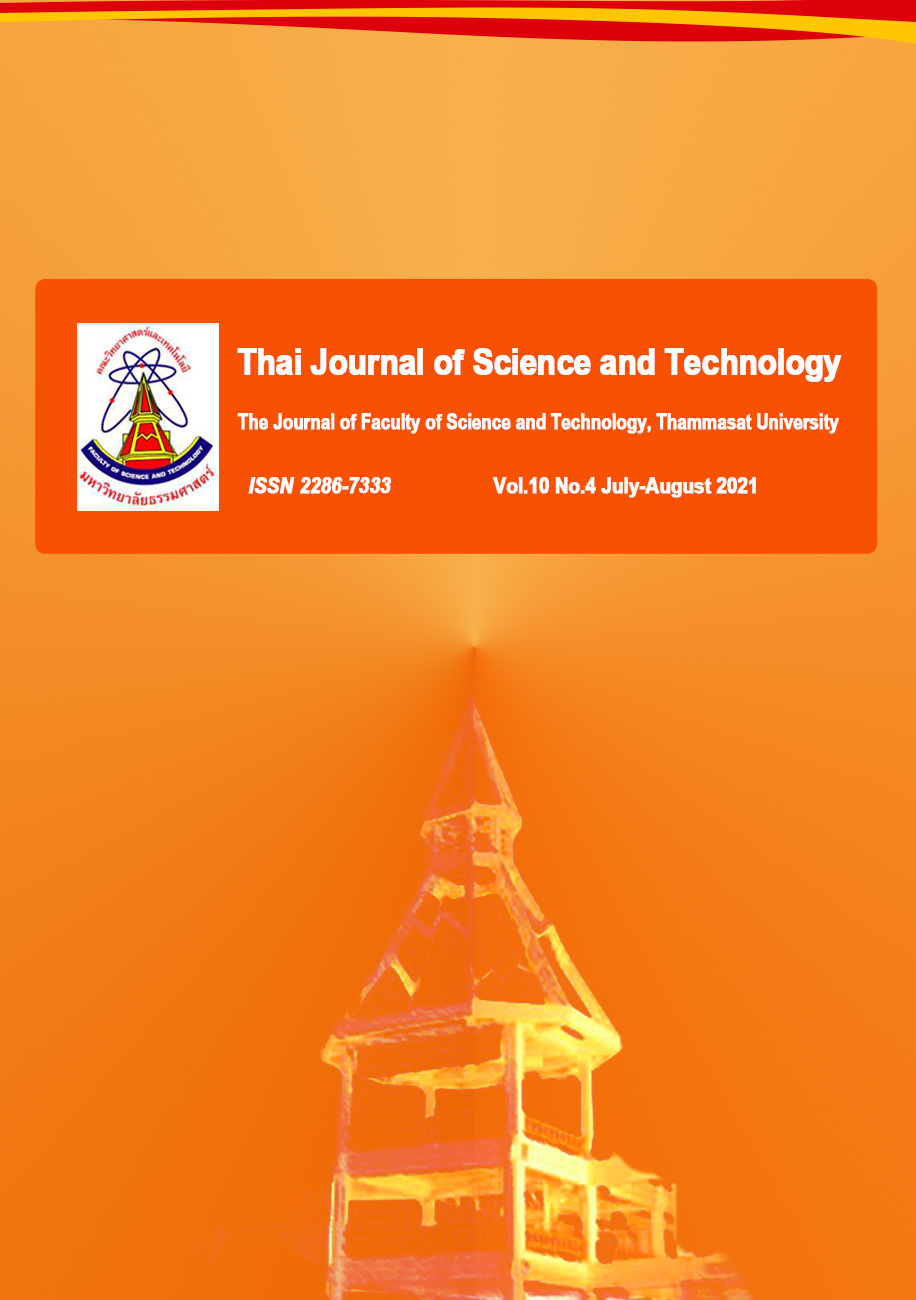Identification of Simple Sequence Repeat Markers(SSR) Specific for Thermo-Sensitive Genic Male Sterile Rice Lines and Their Utilization in Assessment of Seed Purity
Main Article Content
Abstract
Genetic purity is a key for hybrid rice seed production. Genetic purity of parental lines is an important factor affecting the genetic purity of the hybrid seeds. In this study, SSR markers specific for the thermo-sensitive genic male sterile (TGMS) rice lines were identified and used to assess their seed purity. A total of 40 SSR markers distributed on 12 rice chromosomes were used for genotyping 3 TGMS rice lines (IR68301-11-6-4-4-3-6-6, IR76761-4-3-17-34-35, and IR75589-31-27-8-33) obtained from international rice research institute (IRRI), and 20 Thai elite rice verities/lines. The results showed that RM341 was specific for IR68301-11-6-4-4-3-6-6. Four SSR markers (RM1359, RM1362, RM408, and RM219) and three SSR markers (RM190, RM225 and RM21) were specific for IR76761-4-3-17-34-35, and IR75589-31-27-8-33, respectively. In addition, SSR markers specific for eight Thai elite rice verities/lines were identified. The SSR markers specific for each TGMS line were used to determine their seed purity. Seed impurities were detected in 2 out of the 3 TGMS lines, suggesting the precaution for maternal seed production. These markers will be helpful for cultivar identification, seed purity test, intellectual property right (IPR), and future rice breeding programs.
Article Details

This work is licensed under a Creative Commons Attribution-NonCommercial-NoDerivatives 4.0 International License.
บทความที่ได้รับการตีพิมพ์เป็นลิขสิทธิ์ของคณะวิทยาศาสตร์และเทคโนโลยี มหาวิทยาลัยธรรมศาสตร์ ข้อความที่ปรากฏในแต่ละเรื่องของวารสารเล่มนี้เป็นเพียงความเห็นส่วนตัวของผู้เขียน ไม่มีความเกี่ยวข้องกับคณะวิทยาศาสตร์และเทคโนโลยี หรือคณาจารย์ท่านอื่นในมหาวิทยาลัยธรรมศาสตร์ ผู้เขียนต้องยืนยันว่าความรับผิดชอบต่อทุกข้อความที่นำเสนอไว้ในบทความของตน หากมีข้อผิดพลาดหรือความไม่ถูกต้องใด ๆ
References
Akagi, H., Nakamura, A., Yokozeki-Misono, Y., Inagaki, A., Takahashi, H., Mori, K., & Fujimura, T. (2004). Positional cloning of the rice Rf-1 gene, a restorer of BT-type cytoplasmic male sterility that encodes a mitochondria-targeting PPR protein. Theoretical and Applied Genetics, 108(8), 1449-1457. doi:10.1007/s00122-004-1591-2
Akagi, H., Yokozeki, Y., Inagaki, A., Nakamura, A., & Fujimura, T. (1996). A codominant DNA marker closely linked to the rice nuclear restorer gene, Rf-1, identified with inter-SSR fingerprinting. Genome, 39(6), 1205-1209. doi:10.1139/g96-152
Bora, A., Choudhury, P., Pande, V., & Mandal, A. (2016). Assessment of genetic purity in rice (Oryza sativa L.) hybrids using microsatellite markers. 3 Biotech, 6(1), 50. doi: 10.1007/s13205-015-0337-y
Bruinsma, J. (2003). World agriculture: towards 2015/2030: an FAO study. Routledge.
Dong, N., Subudhi, P., Luong, P., Quang, V., Quy, T., Zheng, H., & Nguyen, H. (2000). Molecular mapping of a rice gene conditioning thermosensitive genic male sterility using AFLP, RFLP and SSR techniques. Theoretical and Applied Genetics, 100(5), 727-734. doi:10.1007/s001220051345
FAO. (2012). How to feed the world in 2050. Retrieved from http://www.fao.org/fileadmin/templates/wsfs/docs/expert_paper/How_to_Feed_the_World_in_2050.pdf
Kumar, M., Vishwanath, K., Shivakumar, N., Prasad, R., Radha, S., & Ramegowda, B. (2012). Utilization of SSR markers for seed purity testing in popular rice hybrids (Oryza sativa L.). Annals of Plant Sciences, 1, 1-5.
Mao, C., Virmani, S., & Kumar, I. (1998). Technological innovations to lower the cost of hybrid rice seed production. In the Advances in Hybrid Rice Technology, Proceedings of Third International Symposium on Hybrid Rice, Directorate of Rice Research, India.
Maruyama, K., Araki, H., & Kato, H. (1991). Thermosensitive genetic male sterility induced by irradiation. In Rice Genetics II (pp. 227-232). Philippines.
McCouch, S. R., Chen, X., Panaud, O., Temnykh, S., Xu, Y., Cho, Y. G., & Blair, M. (1997). Microsatellite marker development, mapping and applications in rice genetics and breeding. Plant Molecular Biology, 35, 89-99. doi:10.1023/A:1005711431474
Nandakumar, N., Singh, A., Sharma, R., Mohapatra, T., Prabhu, K., & Zaman, F. (2004). Molecular fingerprinting of hybrids and assessment of genetic purity of hybrid seeds in rice using microsatellite markers. Euphytica, 136(3), 257-264. doi:10.1023/nar/8.19.4321
Noli, E., Conti, S., Maccaferri, M., & Sanguineti, M. (1999). Molecular characterization of tomato cultivars. Seed Science and Technology, 27(1), 1-10.
Pallavi, H., Gowda, R., Shadakshari, Y., Bhanuprakash, K., & Vishwanath, K. (2011). Identification of SSR markers for hybridity and seed genetic purity testing in sunflower (Helianthus annuus L.). Helia, 34(54), 59-66. doi:10.2298/HEL1154059P
Reddy, O., Siddiq, E., Sarma, N., Ali, J., Hussain, A., Nimmakayala, P., & Reddy, A. (2000). Genetic analysis of temperature-sensitive male sterilty in rice. Theoretical and Applied Genetics, 100(5), 794-801. doi:10.1007/s001220051354
Saxena, R. K., Saxena, K., & Varshney, R. K. (2010 Application of SSR markers for molecular characterization of hybrid parents and purity assessment of ICPH 2438 hybrid of pigeonpea [Cajanus cajan (L.) Millspaugh]. Molecular Breeding, 26(2), 371-380. doi:10.1007/s11032-010-9459-4
Sundaram, R., Naveenkumar, B., Biradar, S., Balachandran, S., Mishra, B., IlyasAhmed, M., & Sarma, N. (2008). Identification of informative SSR markers capable of distinguishing hybrid rice parental lines and their utilization in seed purity assessment. Euphytica, 163(2), 215-224. doi:10.1007/s10681-007-9630-0
USDA. (2016). World Agricultural Production. Retrieved from http://usda.mannlib.cornell.edu/usda/fas/worldagproduction//2010s/2016/worldag-production-11-09- 2016.pdf
Virmani, S. (2003). Advances in hybrid rice research and development in the tropics. In the Hybrid rice for food security, poverty alleviation, and environmental protection, Philippines.
Wang, Y., Xing, Q., Deng, Q., Liang, F., Yuan, L., Weng, M., & Wang, B. (2003). Fine mapping of the rice thermo-sensitive genic male-sterile gene tms5. Theoretical and Applied Genetics, 107(5), 917-921. doi:10.1007/s00122-003-1327-8
Wu, M., Jia, X., Tian, L., & Lv, B. (2010). Rapid and reliable purity identification of F 1 hybrids of Maize (Zea may L.) using SSR markers. Molecular Plant Breeding, 3(3), 381-384. doi:10.5376/mgg.2010.01.0001
Ye-Yun, X., Zhan, Z., Yi-Ping, X., & Long-Ping, Y. (2005). Identification and purity test of super hybrid rice with SSR molecular markers. Rice Science, 12(1), 7-12.
Yuan, L. P. (1998). Hybrid rice breeding in China. In S. E. Virmani SS, Muralidharan K (Ed.), Advances in hybrid rice technology (pp. 27-33). Proceedings of the 3rd International Symposium on Hybrid Rice, International Rice Research Institute, Philippines.


